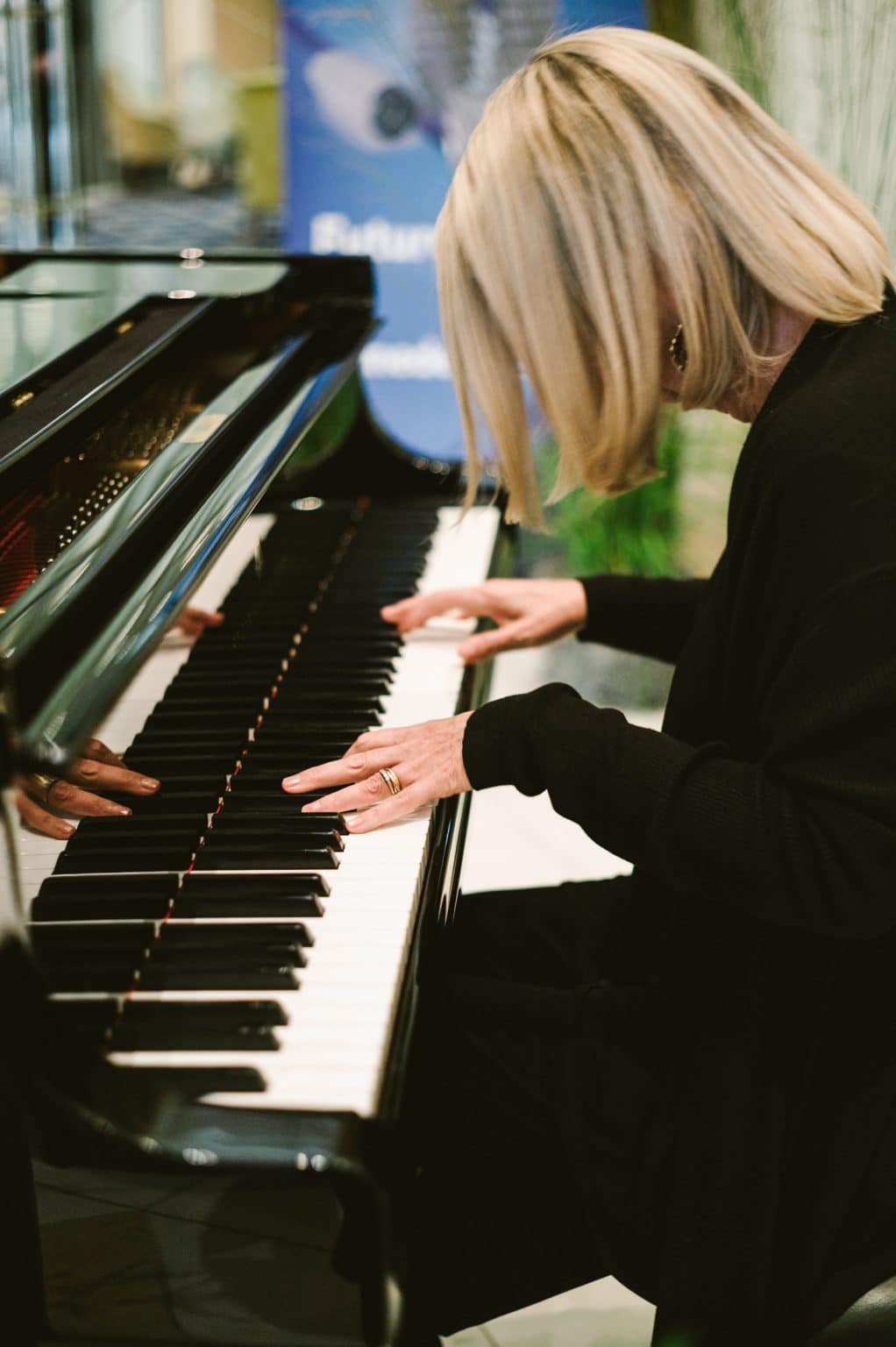I flew for the first time in 1973, the year I turned sixteen. I was headed to New York City to visit Aunt Pinky. The trip, a birthday present from my parents, came on the kitten heels of an unfortunate incident involving a bottle of vodka mixed with Hawaiian Punch, a football player named Mark, and a front closing bra that didn’t close on time. Hung-over, I had green skin and the kind of spiraling nausea that leaves one woozy for days. Grounded? Not me. My parents drove me to the airport and delivered me to the gate of the Allegheny Airlines terminal. I’m guessing Mom and Dad assumed the swoop-dee-doo motion of the flight would be punishment enough. Even when sober, I’ve always suffered from motion sickness.
A chain smoking middle-age businessman (quite possibly a perv, but no one thought of this in 1973) assured my parents he would look after me. He sat next to me and blew smoke in my ear while clutching my arm and whispering: “All those teeny tiny houses and teeny tiny people down there, drinking their little martinis and making love while we fly over them and contemplate life. Makes you wonder what the hell we’re doing up here. Makes you believe in God. Let’s pray.”
I wasn’t wondering about anything. And forget about praying. My main goal during my first flight was to avoid throwing up all over my new black turtleneck sweater.
Things have changed a lot in the last forty years. As I grow older I’m choosing to stay grounded whenever possible. Still, memories linger—bumpy journeys over oceans, majestic mountains, and amber waves of grain; OJ Simpson inspired dashes through crowded terminals (with diaper bag and stroller); joyous arrivals and tearful departures (or is it the other way around?); moments of anticipation while waiting for my Rimowa at the baggage claim black hole. My most memorable episodes feature my kids. Come fly with me as I take a trip down Memory Tarmac.
Head in the Clouds
“Wow, says John. “Nothing like the smell of two hundred passengers opening their peanuts at the same time.” Baby C shares my seat. He is ten months old and a lap-full. We are flying from LaGuardia to Pittsburgh to hand him over to my dear sister, who has graciously agreed to babysit while we fly to Germany to check out a job in Cologne.
I used to fly First Class or Business Class (free upgrades!) but that changed once I had a baby. One look at a gate-checked stroller or a diaper bag, and, well, back of the bus for Junior and me.
“Man,” says John. “Those peanuts really smell awful.”
My eyes cross as the odor hits me. I feel an icky, warm liquid spreading over my thighs.
“That’s not peanuts,” I say to John. “That’s your son.”
Here’s what they don’t tell you in mommy school: Babies are prone to Exploding Diaper Syndrome when flying. Something about the pressure change in the cabin causes a sonic poo detonation so drastic that, unless you are equipped with a complete change of clothing for your infant, a hazmat suit for yourself, and a hose, you are screwed.
I have none of these items with me. I don’t even have a diaper bag. I’m traveling with one extra diaper for C. My sister has a baby boy the same age as C and has instructed me to travel light, since she has a well-stocked baby station.
Passengers stare at me and wrinkle their noses, some of them disguising disdain with vaguely sympathetic nods and snarky smiles. Due to turbulence the seatbelt sign remains on. I strip off C’s clothes on the aisle floor—it’s like wrestling with an oiled baby seal—but the flustered flight attendant sees what’s happening and escorts us to the restroom.
I scrub and rinse and scrub some more. I end up depositing his Baby Gap overalls, onesie, and pullover in the trashcan. Even his socks are filthy, so I ditch them, too. What else can I do? If I don’t get rid of the offending garments before reentering the cabin I’ll cause an international incident.
We land and I carry him, wearing only a diaper, to my sister.
“What?” she says. “Don’t they have baby clothes in New York?”
“Don’t ask.” She looks at my splattered wool pants, the soiled cashmere blazer I had purchased for my European adventure.
“Oh,” she says. “Exploding Diaper Syndrome?”
“Is that what they call it?”
“Even the socks?”
“Even the socks.”
“Welcome to motherhood.” She wraps baby C in her wool shawl, covers him with a fleece blanket, tucks him into her double stroller next to his cousin, and rolls away.
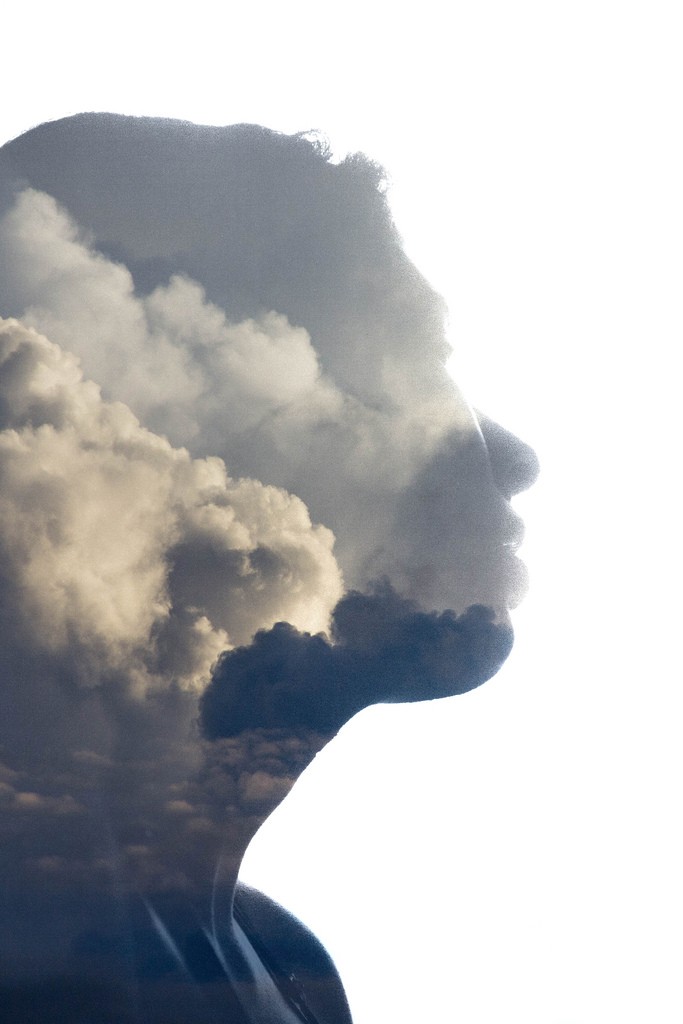
Fly Me to the Moon
Off we go to Germany. We’re moving! Little C and I will fly from Pittsburgh and meet John at JFK. Once there, we’ll board a flight to Cologne, where we’ll make a permanent home for our family. Movers have already packed and shipped my piano and most of our furniture and art.
It’s 1994 so airline officials allow my father to board the plane with C and me, just to help out with all of our stuff and make sure we’re settled into our seats.
It’s an emotional goodbye, and my heart hurts when he bends down to kiss his grandson goodbye. “Remember,” he says to C. “Remember, if you need anything, anything at all, whatever you do, don’t call me!” It’s an old joke that always makes C laugh. He might not understand the words, but he gets that his grandfather is funny, and that’s enough for him.
We arrive at JFK. John is not there waiting for us. I have forgotten that each airline at JFK has its own building. I wait for John for an hour. Where the hell is he? I’m a woman traveling alone with a toddler and a truckload of stuff. The least he could do is meet me at the gate. We don’t have cell phones so I can’t call him. Should I travel to him or will he meet me here? We are playing airport chicken, hoping the other party shows up first. Finally I take my chances and board the aptly named Terminal Bus. When we arrive at Lufthansa I spot John in the distance, pacing and looking at his watch. He has two large suitcases of his own, a couple of carry-ons, and a bass in a traveling case the size of a refrigerator. I might have the baby, but he has the bass. He wins.
The rep at the Lufthansa counter, who looks at us like we’re the Slovenian Traveling Circus, talks John out of buying an extra seat for C. She says the flight is empty and we shouldn’t waste the money. Under the age of two, C still qualifies to be a lap baby. Huge mistake. The flight is packed. Packed! Who knew Germany was so popular? We spend nine hours on board with a feisty toddler (lap baby, my ass) who has decided to channel Robert Deniro’s performance in Cape Fear. He doesn’t sleep, not one wink, and when we arrive in Germany he gets away from me and tries to crawl through the fringe on the baggage conveyor belt. I am so tired I almost let him do it.
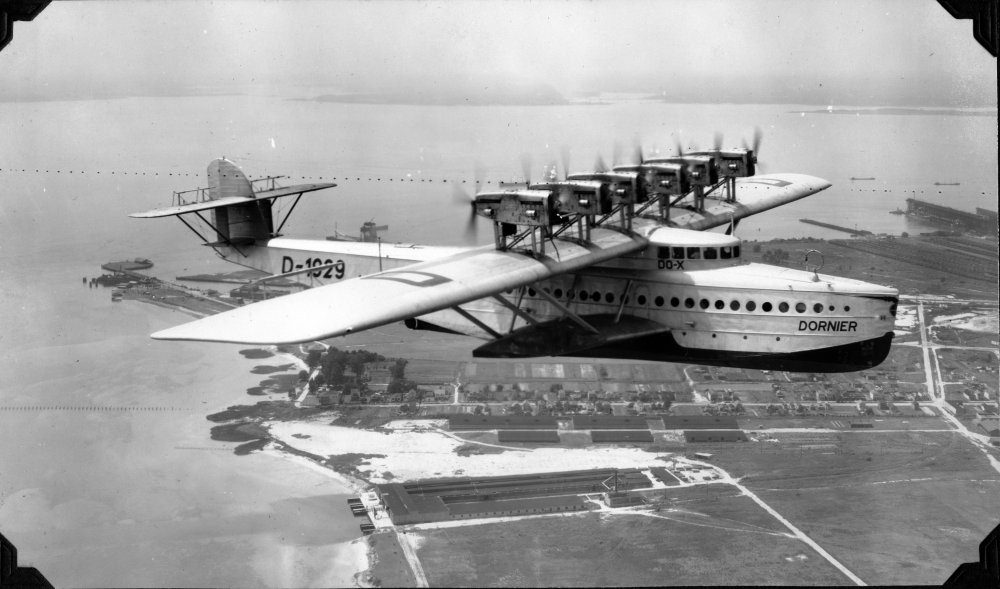
My Beautiful Balloon
We live in Germany but, determined to celebrate an American Christmas, we have flown back to the USA for the annual family gift bonanza, several visits to a food trough, and an amniocentesis because I am pregnant with our second child.
The results come back a few hours after John has started his trip back to Germany. I am staying in Pennsylvania for another few weeks with C, who has just turned three.
The doctor calls to tell me we’re expecting a girl. Thinking John will want to hear the news before boarding a plane in Boston, I have him paged at the airport. The gate officer calls him to the phone.
“It’s a girl!” I say
“It’s a girl!” John repeats.
“It’s a girl!” yells a Greek chorus of smartly uniformed American Airlines well wishers, anxious to congratulate my dashing husband on the birth of his daughter, unaware that she won’t be born for another six months.
Being a smart guy, and sensing an upgrade in the stars, John smiles, says a modest “thank you,” and never mentions he had been responding to a test result, not the actual birth.
“We’re upgrading you to Business Class,” says one of the workers. “Congratulations, Mr. Goldsby!” He boards, orders a scotch on the rocks, and flies the friendly skies.
Two weeks later I also fly through Boston—with little C—on our way back to Germany. Swollen with pregnancy and sad to be leaving friends and family, I look in my purse and realize I’m traveling with twelve Matchbox cars and one MAC Viva Glam lipstick. C and I sit in the back of the plane. I read Cars and Trucks and Things That Go to him until I’m hoarse—this is before in-seat entertainment systems become standard gear on all overseas flights—and wonder why proud dad gets to sit up front with his beverage of choice, but pregnant mom and hyper-toddler have to hang out in the bleacher seats with juice boxes.
Obviously word is out about Exploding Diaper Syndrome.
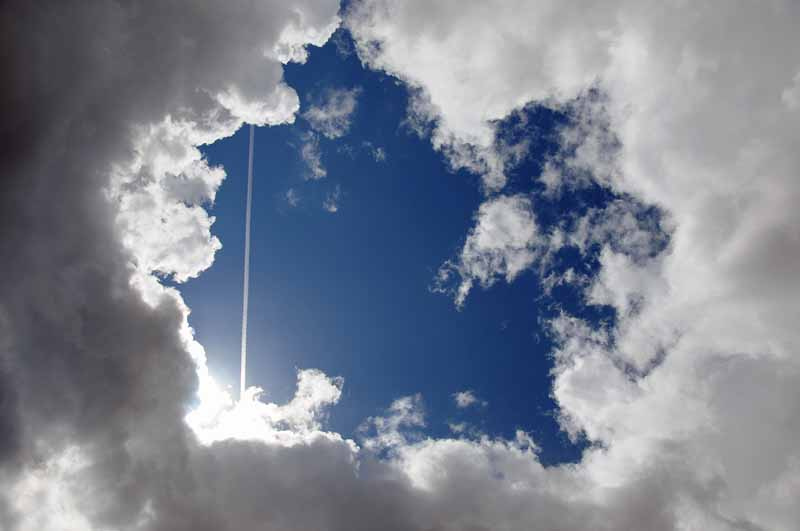
My Girl
Unlike her brother, baby J is a dream passenger—the poster child for international infant travel. The sound of an airplane engine works like Valium on her. Virgin Atlantic provides a baby cot that folds down from the bulkhead. She is thirteen months old and quite long for her age, but doesn’t mind being stuffed into the cot. She falls asleep before we leave Frankfurt, wakes up once to eat, and stays asleep for the rest of the flight. Angel baby. A mile-high Moses jammed in a basket that’s too small.
Her brother sits behind us with John. He has a toy Batmobile with him that shoots inch-long plastic flames. He behaves himself until the screen drops down and the in-flight movie—a disaster film called Volcano—begins. Volcano is not suited for four-year olds, but what can we do—we are inches away from the screen. Our son has refused to close his eyes for even one minute of the marathon flight, and short of blindfolding him there’s no reasonable way to keep him from watching the doomed actors running from the rumbling mountain. When the volcano erupts—boom!—C can’t contain himself and, in a John Waters-inspired moment, shoots his plastic flames into the lap of a fragile young man seated across the aisle. The man shrieks. I can hardly blame him—the poor guy has been sitting there engrossed in an adventure film about molten lava and something that looks like a sizzling ember flies right onto his crotch. We don’t confiscate the Batmobile, but we do pocket the flame attachments. Years later, I will find one of them tucked in the lining of my jacket.
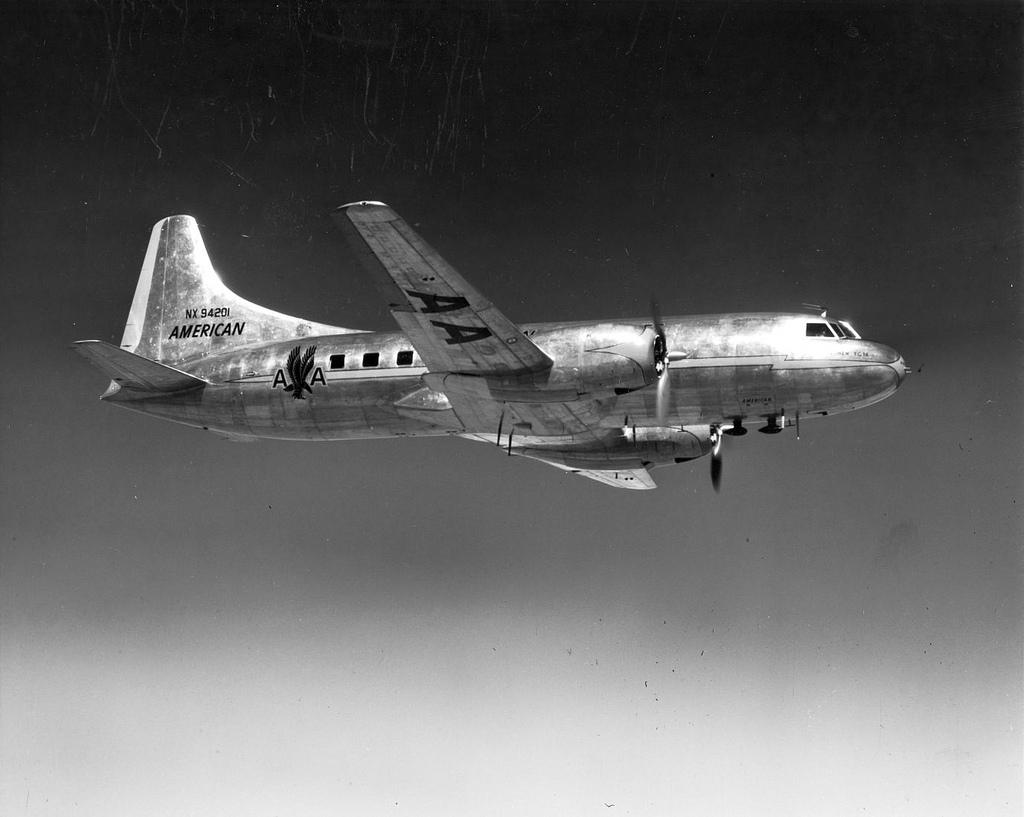
In the Hudson
Our two kids, C and J, are flying alone to the USA. The airline requires a chaperone. Fine, but C, age 15, towers over most adults, and J, an athletic young lady, is not exactly a shrimp. The Air France attendant assigned to accompany my two sweet American children looks aghast when she sees our studio-wrestler sized youngsters. C, in his original gangsta phase, refuses to wear the “Unaccompanied Minor” blaze-orange ID tag around his neck (who can blame him?) and stomps off with the attendant. Julia scurries behind them. I feel bad for the chaperone—she’ll have to drag them a gazillion miles through Aéroport de Paris-Charles-de-Gaulle to put them on the flight to Pittsburgh. Really, these people don’t make enough money.
All goes well, until the return journey.
As most mothers will testify, it’s impossible to sleep when your kids are in the air. At three in the morning, I drag myself out of bed to check their progress on my computer flight tracker. A note tells me their flight from Pittsburgh to Paris has been “diverted.” To New York City. This is one week after Captain Sully Sullenberger has made an heroic emergency landing in the Hudson River. I wake up my husband.
What’s wrong?” he asks.
“They’re in the Hudson,” I say. “Flight diverted. Diverted! Diverted!”
“Who is in the Hudson?
“Our kids. Maybe. There was an emergency landing. Their flight has been diverted. That’s a bad word, diverted. They’re somewhere in New York. Alone.”
“Well,” says John. “Nothing we can do about it until the morning.”
Then he goes back to sleep.
C and J arrive safely the next day, eighteen hours late. I expect to see two shaken and exhausted kids dragging themselves into our welcoming arms. Instead, they bound through the sliding doors, chocolate-pumped, Sprite-fueled, and larger than life. Have they grown? Probably.
“Broken rudder,” says C. “It was so cool—we flew around in circles for a long time so the captain could get the right angle for the landing. Then, after we landed, they left us on the airplane all by ourselves for a long time until they figured out what to do with us. Home alone in New York!”
“Yeah,” says J. “It was really cool.”
“Wait,” I say. “Where’s your chaperone?” We have paid almost three hundred dollars for a service that supposedly protects them against kidnapping by hooded gunmen and other hideous fates. The fee also guarantees supervision from one end of the journey to the other, yet here they are, all by themselves, decked out in baseball caps and sunglasses, and chirping about their über cool emergency landing.
“We ditched the chaperone in Paris. There was some lady in a suit waiting for us but we walked right past her. You know, Mom, we don’t exactly look like little kids. We look like real passengers.”
They have survived a broken rudder, an emergency landing, made it halfway around the world, and collected their bags without me hovering and shouting instructions.
I spend the next week feeling jet-lagged, and I didn’t even fly anywhere.
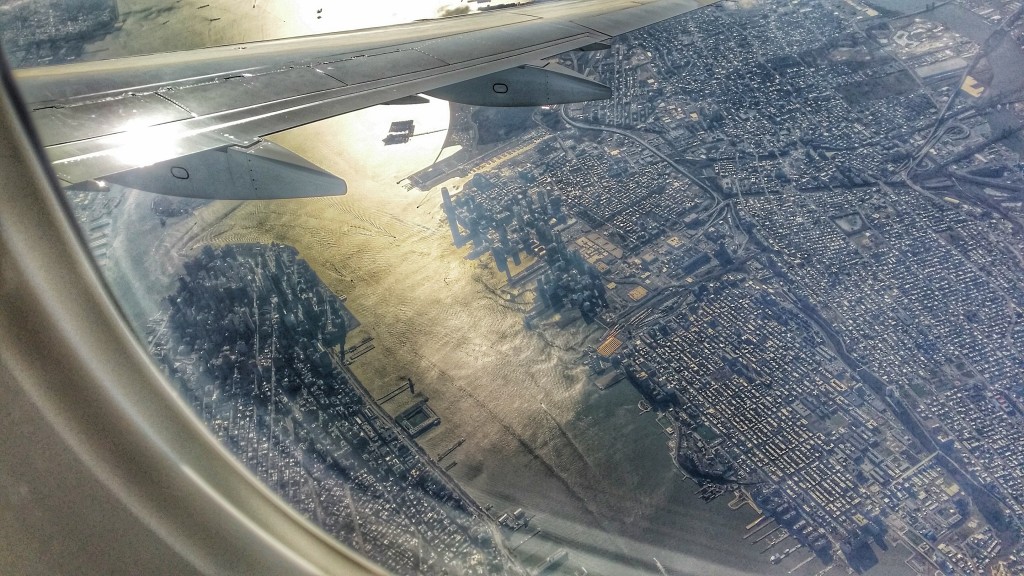
Sunflowers: Remembering MH17
I can’t stop thinking about the sunflowers—beautiful stalks of yellow and brown, their heads tilted toward the pasty Ukrainian sky, looking for light, any light at all. Instead they have been showered with the worst kind of darkness. Innocent bodies—babies and old people and scientists and nuns, dark skinned and light skinned, alone and in groups, intact and in pieces—blasted out of the summer day, flung from the clouds, and dumped randomly into a field of gold.
On July 17th, 2014, my 18 year-old daughter boards a flight from Frankfurt to Shanghai, starting a year of travel as a FAWCO Youth Ambassador, visiting various countries to do volunteer work and promote social awareness to other teenagers. I hold it together at the airport when she leaves, indulging in just a moment of sadness, which I swallow along with a few selfish tears. It’s a mother’s right to cry when her children leave home. Just a little.
I watch carefully as J, clutching her American passport and her Chinese visa, rounds the bend after passing through immigration. I hope for one more wave, a thrown kiss, a wistful smile, but she never looks back. That’s my girl. Seasoned traveler, frequent flyer, world citizen.
She is 18, I tell myself. She is ready for this. She’ll be fine, fine, fine. My husband and I make the 90-minute trip back to Cologne, driving on an endless stretch of Autobahn lined with rolling green hills, cookie-cutter castles, high-speed train tracks, and the occasional IKEA. Puffy clouds, sapphire sky—the world seems hopeful, a friendly planet ready to welcome a teenage girl jetting away on her journey of self-discovery. My nest might be empty, but my heart is full.
We hear the news about MH17, courtesy of a New York Times email alert, shortly after arriving home. After a few calculations, we realize that J’s airplane would have been traveling through the same corridor as MH17 at about the same time. I perch on the sofa, my eyes glued to CNN, listening to media disaster music, while talking heads and “aviation experts” take turns guessing why the plane had crashed. It quickly becomes clear it has been shot down. J’s East China Air flight, it turns out—thank goodness for computer flight-tracking sites—made a fast left turn and headed north at the time of the incident, cruising over Finland to get to China, flying far away from that particular geographical pocket of bloated and power hungry men with rocket launchers.
I know my daughter is safe. Still, thinking of mothers who put their children on MH17 that afternoon, I find it difficult to breathe for the rest of the day. It is summer holiday in Europe. Children leave home, they go on vacations, they take gap years, they volunteer, they explore. We encourage them to go because we want to believe it’s safe out there. And they trust us. They trust us.
Today I watch CNN again as Dutch soldiers, many of them teenagers themselves, carry caskets from airplane to hearse, one by one, in a carefully choreographed ballet of grief. Their military precision suggests a semblance of order in a chaotic world, their meticulousness seems almost exaggerated after the bedlam of the last few days. The King and Queen of Holland, sitting in stiff chairs on the tarmac, pay tribute to the dead, along with dignitaries from the home countries of other victims. The commentator is quick to point out that no one knows which body is in which casket—the remains have yet to be identified—and which passengers, days after the tragedy, might still be lying in a field of Ukrainian sunflowers.
We send our children out into the world. We fret and sweat and worry that they won’t come back. It’s not safe anywhere, we think. They could be shot in an American movie theater or gun-downed in a school massacre. They might be swept away by an Indonesian Tsunami or crushed by a weakened roof in a Baltic snowstorm. They might be maimed by attack dogs or fall in with a bad crowd. I tell myself to calm down—assorted bad guys lurk on every corner, from downtown Pittsburgh to downtown Torez. It’s just as dangerous to keep our kids at home, isn’t it?
“Be careful,” I say. “Be careful out there.” Every mother I know says the same thing to her children when they leave home—for an hour, for a year, forever.
The Dutch soldiers are still loading caskets into big black cars. I imagine the mothers of the children lost on MH17, out of camera range, numb with grief, wondering which of the hundreds of caskets belongs to them. Right now there is no way of knowing, no way to claim their precious and decomposed bodies, no way to turn back time, no way to say goodbye.
The children, I think. The children. They shot our children out of the sky.

Fly Away Home
I can’t remember the last time all four of us flew together. I blame busy school schedules, limited budgets, rising ticket prices. I fly for business six or seven times a year, my husband flies often for work—he was in the USA last week, Ireland right now, Poland in August. The kids fly without worry, just like I did at their age. Between the two of them they have circled the world a couple of times in the last year. Hop on, hop off. Avoid the nachos in Atlanta, order the vegan meal in advance, arrange for the airport pick-up service in Dubai, do anything you can to get the emergency exit row seat.
Wear layers. You never know when you’ll be cold or hot.
I worry. Who doesn’t? Seems like there’s an airplane tragedy every month. I try to look the other way, but I can’t. I recall the words of my first flight companion, the man with the sour cigarette breath and the pesky hands: “Makes you wonder what the hell we’re doing up here.”
Maybe we’re tempting fate. Maybe we’re addicted to new adventure. Ancient cities, sun-soaked beaches, spacious skies, or lands with other charms call out to us. We respond by stalking Expedia, finding the cheapest fare, and jumping on a plane.
Maybe we hate to fly, but we need to make a living, so off we go, collecting worthless frequent flyer miles and foreign coins.
Maybe we’re just trying to get back to the people we love.
Do I miss epic transcontinental flights with manic toddlers on my lap? Do I miss exploding diapers and Matchbox cars and bad in-flight movies about volcanoes? Maybe a little. Maybe not so much. But here’s what I do miss about flying with my kids: I miss the thrill of the plane lifting its heavy feet from the tarmac, the sensation that any destination is within our reach, the absolute certainty that we’ll get there together, a flock of Goldsbys defying gravity and heading home.
***
Robin Meloy Goldsby is a Steinway Artist. She is also the author of Piano Girl; Waltz of the Asparagus People: The Further Adventures of Piano Girl; and Rhythm: A Novel.
Coming soon: Manhattan Road Trip, a collection of short stories about (what else?) musicians.
Sign up here to receive Robin’s monthly newsletter. A new essay every month!
